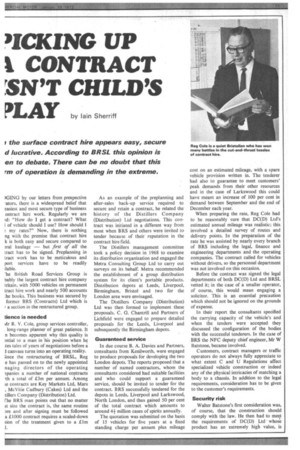PICKING UP I CONTRACT SN'T CHILD'S
Page 53

If you've noticed an error in this article please click here to report it so we can fix it.
PEAY by lain Sherriff r the surface contract hire appears easy, secure d lucrative. According to BRSL this opinion is en to debate. There can be no doubt that this rm of operation is demanding in the extreme.
OGING by our letters from prospective .ators, there is a widespread belief that easiest and most secure type of business ontract hire work. Regularly we are ;d: "How do I get a contract? What 1 of vehicle should I use? How should I ; my rates?" Now, there is nothing ng with the premise that contract hire k is both easy and secure compared to :ral haulage — but first of all the tract has to be signed. Preplanning in tract work has to be meticulous and port services have to be readily [table.
he British Road Services Group is bably the largest contract hire company ;ritain, with 5000 vehicles on permanent tract hire work and nearly 500 accounts he books. This business was secured by former BRS (Contracts) Ltd which is a section in the restructured group.
Hence is needed dr R. V. Cole, group services controller, long-range planner of great patience. It n becomes apparent why this quality is mtial to a man in his position when he tes tales of years of negotiations before a I canvass turns into an operating reality. ;ince the restructuring of BRSL, Reg e has passed on to the newly appointed naging directors of the operating ipanies a number of national contracts th a total of .E3m per annum. Among m contracts are Key Markets Ltd, Mars , McVitie Cadbury (Cakes) Ltd and the tillers Company (Distribution) Ltd.
[le BRS man points out that no matter It size the contract is, the same routine )re and after signing must be followed a £11000 contract requires a scaled-down &ion of the treatment given to a Lim As an example of the preplanning and after-sales back-up service required to secure and retain a contract, he related the history of the Distillers Company (Distribution) Ltd negotiations. This contract was initiated in a different way from most when BRS and others were invited to tender because of their reputation in the contract hire field.
The Distillers management committee took a policy decision in 1968 to examine its distribution organization and engaged the Metra Consulting Group Ltd to carry out surveys on its behalf. Metra recommended the establishment of a group distribution system for its client's portable products. Distribution depots at Leeds, Liverpool, Birmingham, Bristol and two for the London area were envisaged.
The Distillers Company (Distribution) Ltd was then formed to implement these proposals. C. G. Chantrill and Partners of Lichfield were engaged to prepare detailed proposals for the Leeds, Liverpool and subsequently the Birmingham depots.
Guaranteed service
In due course B. A. Davies and Partners, consultants from Kenilworth, were engaged to produce proposals for developing the two London depots. The reports proposed that a number of named contractors, whom the consultants considered had suitable facilities and who could support a guaranteed service, should be invited to tender for the contract. BRS successfully tendered for the depots in Leeds, Liverpool and Larkswood, North London, and thus gained 50 per cent of the total contract which amounts to around 4+ million cases of spirits annually.
The quotation was submitted on the basis of 15 vehicles for five years at a fixed standing charge per annum plus mileage cost on an estimated mileage, with a spare vehicle provision written in. The tenderer had also to guarantee to meet customers' peak demands from their other resources and in the case of Larkswood this could have meant an increase of 100 per cent in demand between September and the end of December each year.
When preparing the rate, Reg Cole had to be reasonably sure that DC(D) Ltd's estimated annual mileage was realistic; this involved a detailed survey of routes and delivery points. In the preparation of the rate he was assisted by nearly every branch of BRS including the legal, finance and engineering departments and the operating companies. The contract called for vehicles without drivers, so the personnel department was not involved on this occasion.
Before the contract was signed the legal departments of both DC(D) Ltd and BRSL vetted it; in the case of a smaller operator, of course, this would mean engaging a solicitor. This is an essential precaution which should not be ignored on the grounds of expense.
In their report the consultants specified the carrying capacity of the vehicle's and when the tenders were accepted they discussed the configuration of the bodies with the successful tenderers. In the case of BRS the NFC deputy chief engineer, Mr W Batstone, became involved.
Customers, contract managers or traffic operators do not always fully appreciate to what extent C and U Regulations affect specialized vehicle construction or indeed any of the physical intricacies of matching a body to a chassis. In addition to the legal requirements, consideration has to be given to the customer's requirements.
Security risk Walter Batstone's first consideration was, of course, that the construction should comply with the law. He then had to melt the requirements of DC(D) Ltd ' whose product has an extremely high value, is




















































































































